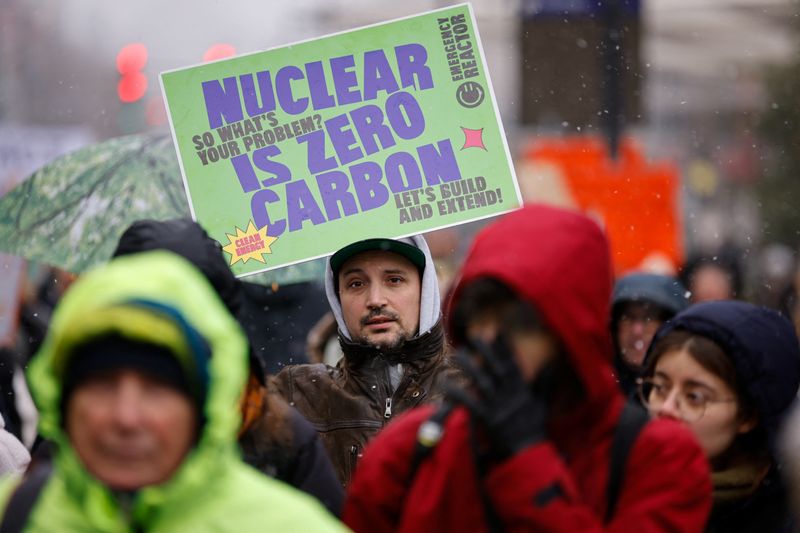By Simon Jessop, Hadeel Al Sayegh and Yousef Saba
DUBAI (Reuters) -Money pledges piled up at COP28 in Dubai on Monday, as delegates sought to close the huge gap between what is needed in climate finance and the amounts on offer so far.
The United Arab Emirates, host of this year’s conference, pledged to mobilize $270 billion in green finance through its banks by 2030, and several development banks announced plans to boost their financing efforts, including by agreeing to suspend debt repayments if a climate-related situation occurs. disaster strikes.
But the leaders of the region’s largest economy and largest OPEC oil producer Saudi Arabia have not attended the UN summit so far, unlike their participation in last year’s COP27 conference in Sharm el-Sheikh, Egypt .
On Monday, Prince Abdulaziz bin Salman, energy minister and the kingdom’s top climate negotiator, did not attend the Saudi Green Initiative, a side event where the country’s clean energy plans were presented.
De facto ruler Crown Prince Mohammad bin Salman also did not deliver a speech to world leaders on Friday as planned.
As tensions ran high over differing views on the future of fossil fuels, COP28 President Sultan al-Jaber defended his role after The Guardian newspaper quoted him as criticizing the science behind the need to ‘phase out’ fossil fuels. doubted.
Al Jaber has also drawn criticism in relation to his role as CEO of ADNOC, the UAE’s state oil company.
“I am quite surprised by the continued and repeated attempts to undermine the work of the COP28 presidency,” Al Jaber said at a press conference. “We strongly believe and respect science.”
GREAT NEEDS
The amount of money needed for energy transition, climate adaptation and disaster relief is overwhelming.
A report published Monday estimates that emerging markets and developing countries will need $2.4 trillion a year in investments to limit emissions and adapt to the challenges of climate change.
“The world is not on track to achieve the goals of the Paris Agreement. The reason for this failure is a lack of investment, especially in emerging markets and developing countries outside China,” said co-author Nicholas Stern, chairman of Grantham Research. Institute for Climate Change and the Environment.
The 2015 Paris conference set a goal of limiting global warming to well below 2 degrees Celsius (3.6 degrees Fahrenheit), while aiming for a maximum of 1.5 degrees Celsius.
“The central challenge is to accelerate and implement the promotion and financing of this investment from a range of sources,” Stern said.
Vulnerable countries that are already affected by costly climate disasters are asking for billions more through a newly established disaster fund. Commitments to the fund to date are approximately $700 million.
“Unless we have urgent decision-making, we will suffer what every parent suffers: raising expectations and not being able to deliver,” said Prime Minister Mia Mottley of Barbados, a prominent voice in global discussions on mobilizing climate finance.
At a news conference, she urged countries to go beyond voluntary pledges and pleas to charities and private investors and instead consider taxes as a way to boost climate finance.
For example, a 0.1% global tax on financial services could raise $420 billion, she said, while a 5% tax on global oil and gas profits would have raised about $200 billion by 2022.
“The planet needs global governance, not in a big way, but in a simple way where we work together to work with the institutions that we have,” she added.
Other delegates, including UN Secretary General Antonio Guterres, have called for an end to fossil fuel subsidies, which have reached a record $7 trillion a year.
Activists from the Asian People’s Movement for Debt and Development said they feared the amounts pledged would be insufficient.
“The climate financing they pledged at this COP28 is simply not enough,” said Pakistani activist Zaigham Abbas, whose country was devastated by floods last year. “We are not here looking for charity… The scale of the catastrophe we are staring at is unprecedented.”
MOVE MONEY
The biggest pledge on Monday came from the UAE’s banking system, which joined peers in other regions in lending more to green projects. It followed a pledge Friday of $30 billion for climate-related projects by the oil-producing Gulf state.
Elsewhere, France and Japan said they would support an African Development Bank initiative to leverage the IMF’s Special Drawing Rights for climate and development.
The European Bank for Reconstruction and Development, meanwhile, said it would include climate-resilient debt clauses in new loan deals with some poorer countries.
Danish investment firm Copenhagen Infrastructure Partners has announced plans to raise $3 billion for sustainable projects in emerging markets.
This year will see the largest business representation yet at the annual UN summit, fueling hopes for more private investment in the fight against climate.
The Emirate of Abu Dhabi teamed up with private sector partners, including BlackRock (NYSE:) and HSBC, to launch a climate research and advisory center to increase financing opportunities in the region.

“The scale of the climate crisis requires urgent and breakthrough solutions from every sector,” Jaber said. “Finance plays a crucial role in turning our ambitions into action.”
For daily in-depth coverage of COP28 in your inbox, sign up for Reuters Sustainable Switch (NYSE:) newsletter here.


